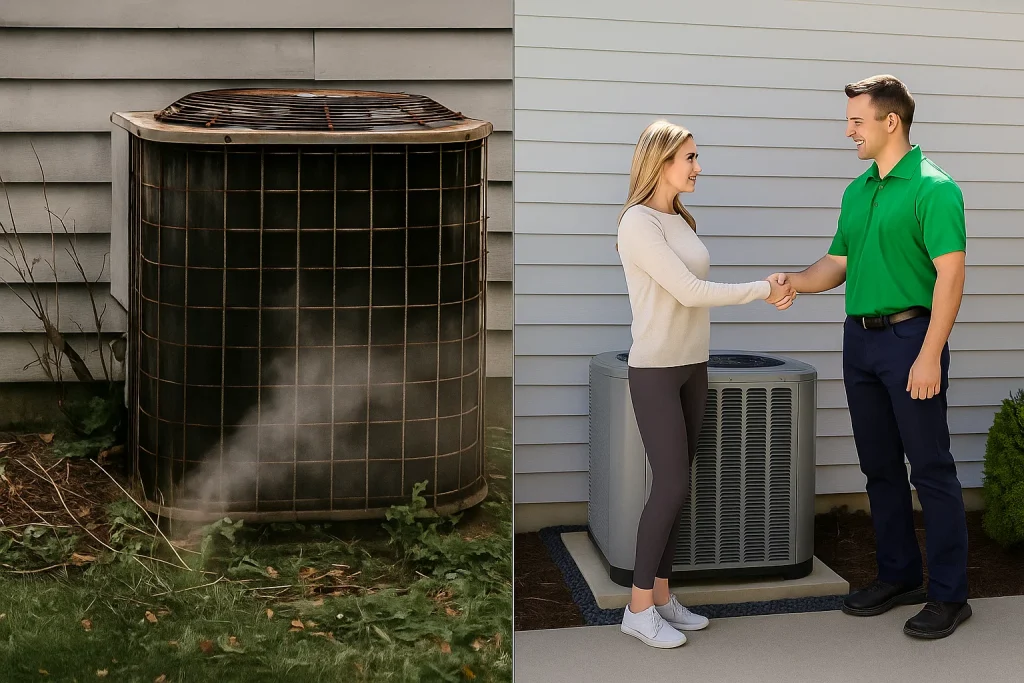Few things are more stressful than when your heating or cooling system isn’t doing its job. Maybe your home isn’t as comfortable as it used to be, or perhaps you’ve noticed unusual noises, inconsistent airflow, or rising energy bills. These can be warning signs of issues such as a clogged filter, malfunctioning thermostat, or even loose or broken components in your furnace. A furnace that fails to produce enough heat is another common sign of malfunction. When these problems come up, most residents ask the same question: should I repair my HVAC system, or is it time to replace it?
Today’s HVAC systems include a wide range of heating and cooling solutions, such as furnaces, air conditioners, heat pump systems, ductless mini-split ACs, and central air conditioning. These systems work together to provide year-round comfort for residents, ensuring your family stays comfortable no matter the season. Regular inspections and tune-ups are important to identify potential issues before they become major problems, helping to keep your heating system and cooling systems running efficiently.
Routine maintenance can help prevent common furnace problems like a clogged filter, faulty ignition system, or malfunctioning thermostat. These issues often present warning signs such as unusual noises, reduced heat, or a yellow flame, which can indicate incomplete combustion and should be addressed promptly. Remember, furnaces involve complex electrical and gas components that can pose significant safety risks if handled improperly, so it’s crucial to rely on professional service technicians for diagnosing, fixing, and maintaining your system.
Repairs are often the faster and less expensive choice upfront, but replacements can save you from repeated breakdowns and higher costs over time. Professional furnace repair services are committed to doing the right thing, serving customers and the community by providing reliable solutions that prioritize safety, follow strict safety protocols, and adhere to local building codes. Experienced technicians are dedicated to fixing issues accurately, extending your system’s lifespan, and ensuring long-term reliability. Annual maintenance plans can also help keep your HVAC systems, including furnaces, operating efficiently and prevent major problems.
Mahalo Heating and Air Conditioning is a family-oriented business that treats customers like family, committed to serving the local community with forward-thinking solutions. Modern systems offer the convenience of controlling your comfort via phone, and targeted comfort options let you cool only the area you need, leaving the rest of the house unaffected and improving efficiency. Let’s look at the factors to consider so you can feel confident about your next step.

Understanding HVAC Systems
Heating, Ventilation, and Air Conditioning (HVAC) systems are the backbone of comfort in any home or business, especially in Douglas County, Oregon, where temperatures can swing from chilly winter months to hot summer days. These systems are designed to provide reliable heating and cooling services, ensuring your indoor environment stays comfortable and healthy all year long.
There are several types of HVAC systems available, each offering unique benefits to suit different needs. Air conditioning units are essential for keeping your house cool during the hottest days, while furnaces provide dependable warmth when the weather turns cold. Heat pumps are a popular, energy-efficient solution because they can both heat and cool your home, making them ideal for Oregon’s varied climate. For homes without existing ductwork, a ductless system offers flexible installation and efficient operation, with an indoor unit that delivers targeted comfort to any room.
Routine maintenance is key to keeping your HVAC system running smoothly and efficiently. Regular tune-ups and maintenance services help prevent issues like clogged filters or broken components, which can impact airflow and drive up your energy bills. Experienced technicians from a reputable company can provide high quality service, from diagnosing minor problems to performing thorough repairs and system tune-ups. By investing in routine maintenance, you not only extend the life of your equipment but also maintain optimal efficiency and indoor air quality.
When it’s time to replace an old or inefficient system, upgrading to a new system can offer significant benefits. Modern HVAC equipment is designed with advanced technology for improved efficiency, lower energy bills, and enhanced comfort. Many new systems feature smart thermostats, air purification, and improved ventilation, making it easier to maintain a healthy indoor environment. Choosing an energy efficient solution not only benefits your family’s comfort but also supports a more sustainable future.
Navigating the options in the HVAC industry can feel overwhelming, but working with a knowledgeable and experienced team makes the entire process easier. Whether you need installation, repair, or ongoing maintenance, a trusted company will help you select the right system for your needs and budget, ensuring it’s installed and maintained to the highest standards.
By understanding how HVAC systems work and the importance of regular maintenance, you can make informed decisions that keep your home comfortable, your energy bills manageable, and your equipment running efficiently for years to come.
When Does HVAC Repair Make Sense?
Not every HVAC issue requires a new system. In many cases, a skilled technician can restore your comfort quickly and affordably with the right repair. Here are a few examples:
- Your system is relatively new: Most HVAC systems are designed to last 10–15 years. If yours is well under that range and you’ve kept up with routine maintenance, repairing is usually a smart choice.
- The problem is minor: Common issues such as blocked drain lines, faulty thermostats, clogged filters, loose parts, or worn belts can be resolved without major expense by experienced service technicians.
- Your energy bills are stable: If your system still runs efficiently and your monthly bills haven’t spiked, repairing can help you get the most out of your current equipment.
- Repairs are infrequent: An occasional breakdown is normal, but if your unit generally runs smoothly, it makes sense to address problems as they arise.
Experienced service technicians provide effective solutions by accurately diagnosing and fixing furnace problems, such as a faulty ignition system, clogged filter, or malfunctioning thermostat. This approach helps prevent further issues, extends your system’s lifespan, and ensures customers receive attentive, customer-focused service.
In short, if your system is younger, reliable, and efficient, a repair is often all you need.
Clear Signs You Should Replace Your HVAC System
While repairing can be the right solution in some cases, there comes a point where replacement is the better long-term investment. You may want to consider upgrading your HVAC system if you notice:
- Frequent breakdowns: If you’re calling for service several times a year, those costs, and the frustration, add up quickly.
- Age of the system: HVAC units don’t last forever. Once your system is over 10–15 years old, it’s often more cost-effective to replace it.
- High energy bills: An older system loses efficiency over time, meaning it needs more energy to heat or cool your home. A new, high-efficiency system can bring those costs back down.
- Comfort problems: Uneven temperatures, poor airflow, or difficulty maintaining your desired settings could indicate your system is no longer capable of performing properly.
- Costly repairs: As a general rule, if the repair bill approaches 50% of the cost of a new unit, replacement makes more sense.
- Warning signs such as a furnace failing to produce enough heat: Insufficient heat is a common sign of malfunction and may indicate it’s time for a replacement.
Moving forward with a new system ensures reliable operation and better serves the needs of residents, especially during cold months when safe and efficient heating is crucial.
Modern HVAC systems are designed with advanced technology that offers improved comfort, better air quality, and significantly higher efficiency ratings than units made just a decade ago.
Balancing HVAC Repair vs. Replacement Costs
The decision between repair and replacement isn’t always clear-cut, and every situation is unique. A thorough inspection from our trusted team is the best way to determine the right course of action. Mahalo Heating and Air Conditioning is committed to doing the right thing for our community by providing honest, safety-focused recommendations and strictly following all local building codes. Our professionals can provide guidance based on your system’s age, condition, and performance, helping you avoid both unnecessary expenses and preventable breakdowns.
Choosing a Reliable HVAC Service Provider
Mahalo Heating and Air Conditioning is a family-oriented business dedicated to serving customers in the local community. Whether you need a quick fix or a brand-new system, having the right partner makes all the difference. We specialize in HVAC solutions for maintaining comfortable living conditions in Roseburg homes. Our highly trained service technicians are committed to providing personalized, attentive service and tailored solutions to meet your specific needs. We take pride in offering honest recommendations, evaluating your system, explaining your options clearly, and helping you decide whether repair or replacement is the best choice for your home.
Frequently Asked Questions
Question: When should I choose to repair my HVAC system instead of replacing it?
Answer: You should consider repairing your HVAC system when it’s relatively new (well under 10–15 years old), the issue is minor, energy bills are stable, and breakdowns are infrequent. In these cases, a repair can restore comfort quickly and cost less upfront.
Question: What are signs that it’s time to replace my HVAC system?
Answer: It’s often time to replace your HVAC system if it’s over 10–15 years old, has frequent breakdowns, high energy bills, uneven temperatures, or repair costs nearing half the price of a new unit. A modern system also offers better efficiency and comfort.
Question: How does the age of my HVAC system affect the repair vs. replace decision?
Answer: Age is a key factor. Most HVAC systems last around 10–15 years. Older units that require frequent fixes or use obsolete refrigerants may be more expensive to maintain than replacing with a newer, more efficient system.
Question: How do long‑term costs influence whether I should repair or replace?
Answer: Long‑term costs matter. Frequent repairs add up, and newer systems typically use less energy, saving money over time. Tools like the “$5,000 rule” can be used to decide if replacement will be more economical than repeated repairs.
Question: Do newer HVAC systems offer benefits beyond cost savings?
Answer: Yes. Newer HVAC systems often provide improved comfort, better indoor air quality, advanced technology, and higher energy efficiency, which can enhance overall home comfort and reduce utility bills.
Contact Mahalo Heating and Air Conditioning today to schedule your HVAC inspection and find the solution that keeps your home comfortable year-round.










